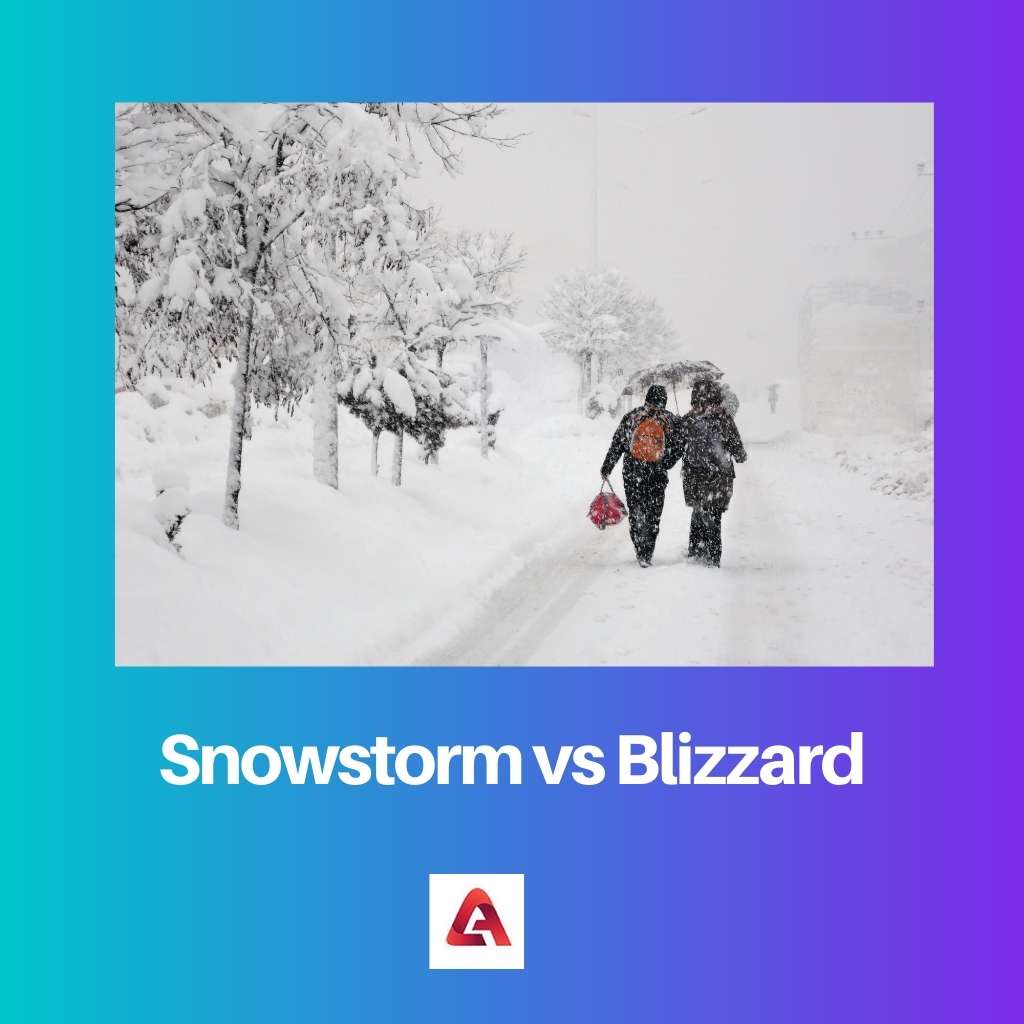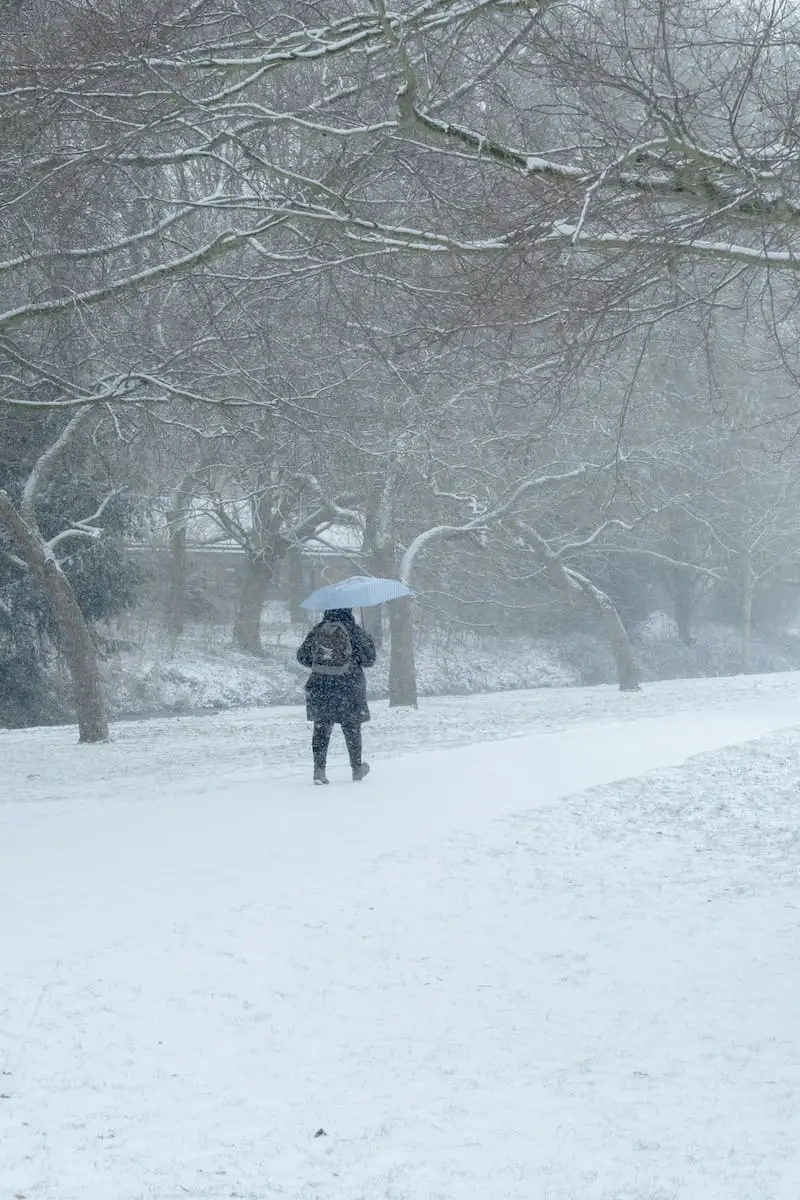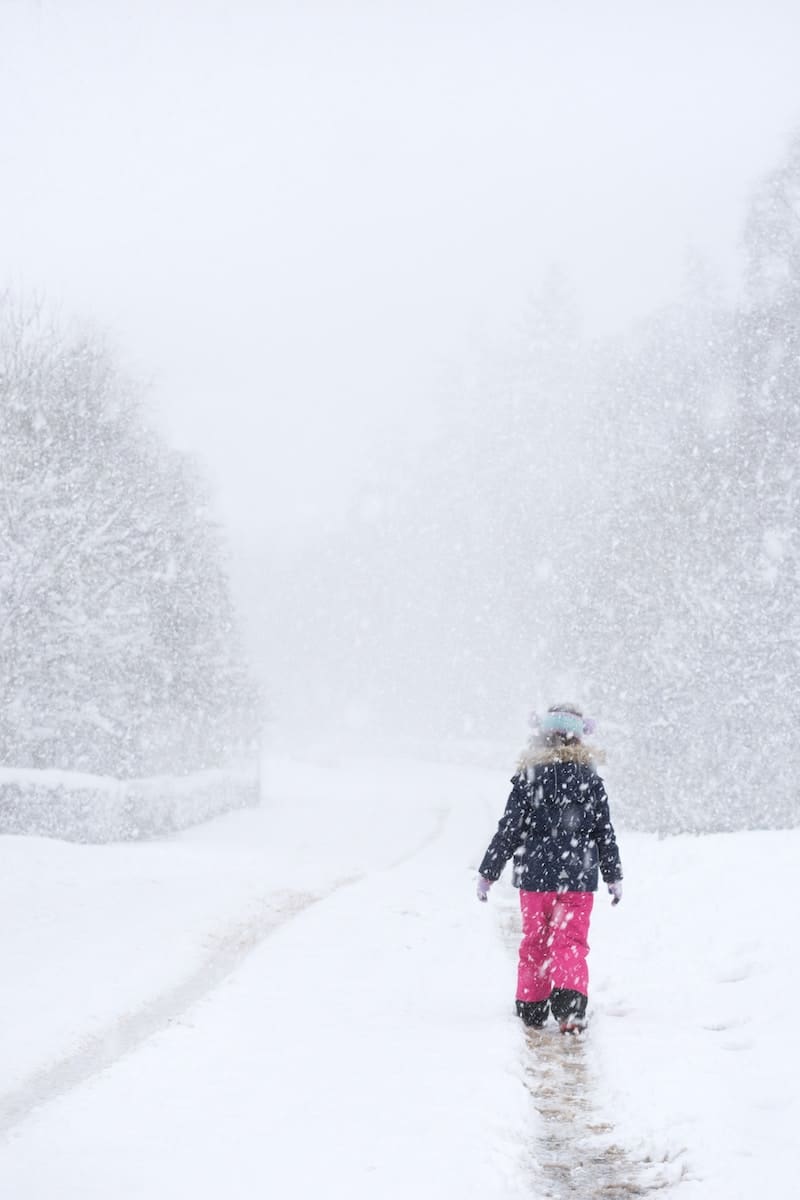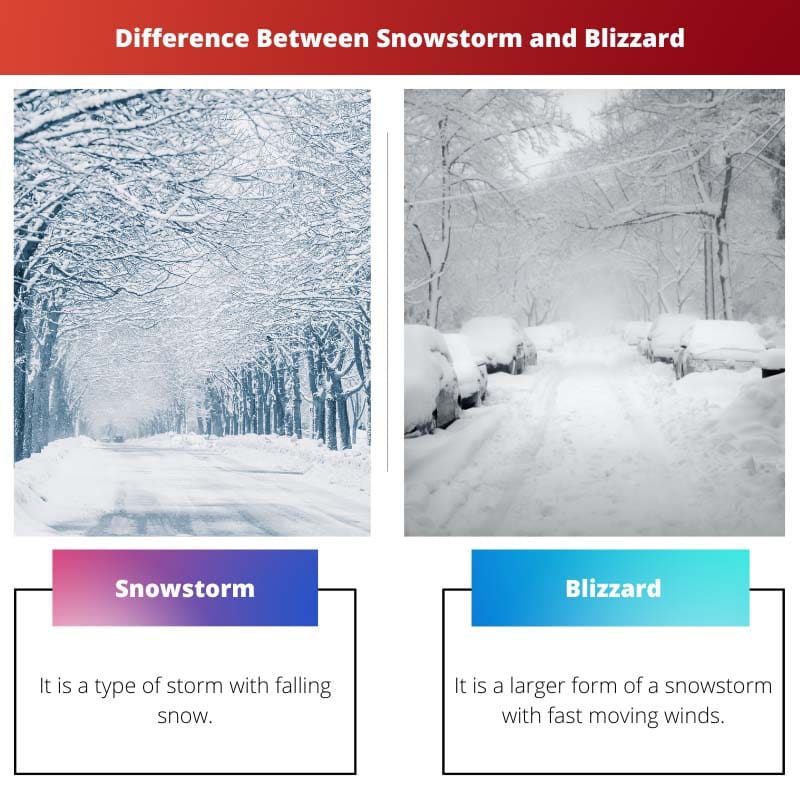Both the terms, snowstorm and blizzard are bad weather conditions that lead to high damage to property and life. They have their causes and effects based on which they can be distinguished from each other.
Let us discuss the difference between the two terms in detail.
Key Takeaways
- Snowstorms are characterized by significant snowfall, while blizzards involve high winds, low visibility, and heavy snowfall.
- Blizzards require sustained wind speeds of at least 35 mph and visibility of less than 1/4 mile for a minimum of 3 hours.
- Snowstorms vary in intensity and duration, whereas blizzards are more severe and dangerous weather events.
Snowstorm vs Blizzard
A snowstorm is a meteorological event characterized by significant snowfall and wind, leading to reduced visibility and challenging travel conditions. Blizzard is a severe snowstorm with sustained winds or frequent gusts of 35 mph or more, leading to very poor visibility and even more dangerous conditions.

Snowstorms are considered less severe due to the lack of low visibility, but they are still dangerous, especially when driving or running on slow surfaces. These storms are characterized by freezing temperatures or less than freezing temperatures which includes snow, sleet, ice and freezing rain.
Blizzards are possible in any area with freezing temperatures and snow. In North America, blizzards are common across the northern Plains, the Midwest and across Canada.
They also occur in the northeastern United States, but the snow in coastal areas is more humid and heavier.
Comparison Table
| Parameters of Comparison | Snowstorm | Blizzard |
|---|---|---|
| Definition | It is a type of storm with falling snow | It is a larger form of a snowstorm with fast moving winds |
| Environmental effects | It leads to rain and low temperature | Extreme whiteout conditions with very less visibility |
| Most common season | Can occur during autumn, spring or winter | Most common season is winters |
| Types | Hailstorm, ice-storm, windstorm with snowfall | Ground blizzard, mountain blizzard, lake effect blizzard etc. |
| Effects | Crop damage, accidents etc. | Telephone lines damage, accidents due to less visibility etc. |
What is a Snowstorm?
Snowstorms are caused by an increase in humid air in a tropical low-pressure area. The storm forces a relatively warm, humid air mass over the cold air mass.
If the air near the surface is not cool enough on a layer deep enough, snow will fall. As winds also move during these additional tropical cyclones (low-pressure areas), strong winds can develop into strong storms, sometimes leading to blizzard conditions.
The amount of snowfall depends on how fast the warm air is moving over the cold air, how much water vapor is available to pour rain and how fast the storm is moving (slower than in one place). The magnitude of a snowstorm depends on how quickly the warm air lifts moisture in the air and wind.
Avalanche is an interesting natural phenomenon that occurs when it rains in the form of snow. Avalanches occur in high and mid-latitudes.
They also occur in Antarctica. They are common in North America, Canada, Europe, Russia and North Asia.
It is not surprising that they form during the winter from December to February. The lake effect ice storm occurs when cold air travels long distances over warm lake water before turning to rain and snow.
When the wind blows forcefully over the mountains and snow accumulates, it is called an orographic snowstorm.
To qualify as a snowstorm, the average snowfall must be up to 2 inches (5.08 cm) and winds less than 35 mph.

What is a Blizzard?
A blizzard is a significant snowfall or rush of wind with winds of more than 35 mph and less than 1/4 mile visibility. At least 3 hours.
Blizzards are common in the upper Midwest and Great Plains but can occur where strong blizzards occur. Blizzard conditions develop on the northwest side of a severe storm system, meteorologists explain.
The difference between low pressure in a storm and high pressure in the west creates a strong pressure gradient or pressure difference between the two places, resulting in very strong winds.
Blizzards limit visibility by a quarter of a mile or less as a result of blowing snow. Extreme snowstorms with wind speeds of more than 45 mph, 70 F or fewer temperatures, and visibility close to zero.
There are no snowfall in-ground snowstorms, but snow appears to be flying near the ground. Blizzards occur when warm moist air rises above the cold dry air from the equator to the poles, and temperatures below the freezing point move from the poles to the equator.
An area is formed between two air masses, where ice forms and falls to the ground.
Blizzards are devastating and dangerous. Very low temperatures can quickly lead to hypothermia, frostbite, permanent nerve damage and in severe cases death.
Visibility is very limited, making this journey extremely dangerous. Severe blizzards can easily trap vehicles in the snow, damaging communication and power lines and making roads impassable.

Main Differences Between Snowstorm and Blizzard
- A snowstorm may include rain, snow, ice appearing on shrapnel, rims or cold objects, and grapple or soft snowflakes or ice flakes. On the other hand, during a blizzard, snowfall is the main precipitation during a blizzard.
- The former can lead to a mixture of winter rain and snow pellets on the other hand, latter leads to whitewash which means there is very little visibility.
- Crops are damaged after a snowstorm as well as power outages or car accidents are the most common consequences. Although a blizzard is a severe form of a snowstorm, its effects can be quite severe.
- Autumn, winter and spring are the most common times of snowstorm, but blizzards most occur in winter.
- We can define a snowstorm as a condition of bad weather, consisting of a huge rush of wind. A blizzard can be defined as a large blizzard with strong winds and gusts of wind which leads to zero visibility conditions.

- https://jamanetwork.com/journals/jama/article-abstract/373266
- https://www.tandfonline.com/doi/abs/10.1080/00385417.1978.10640252
